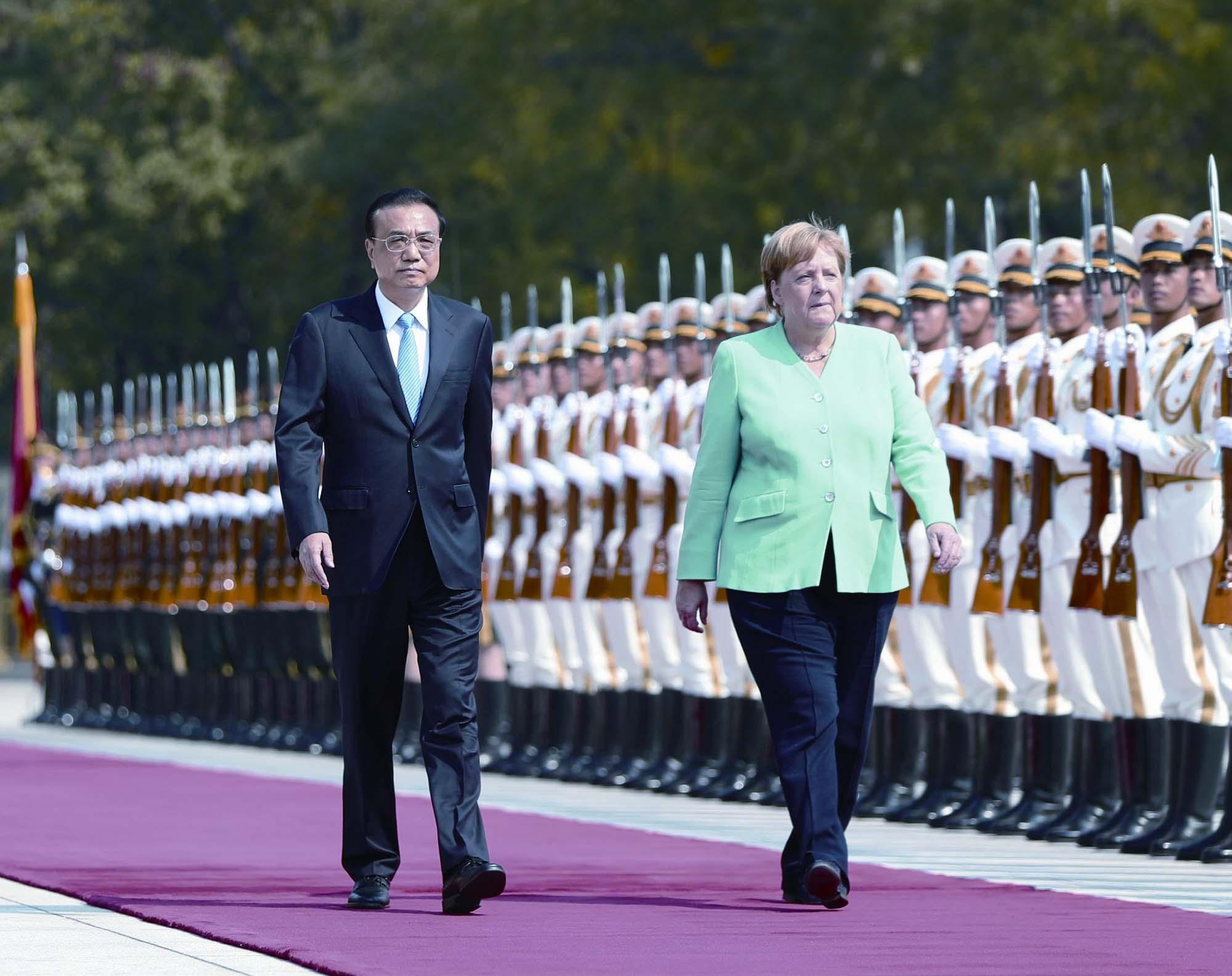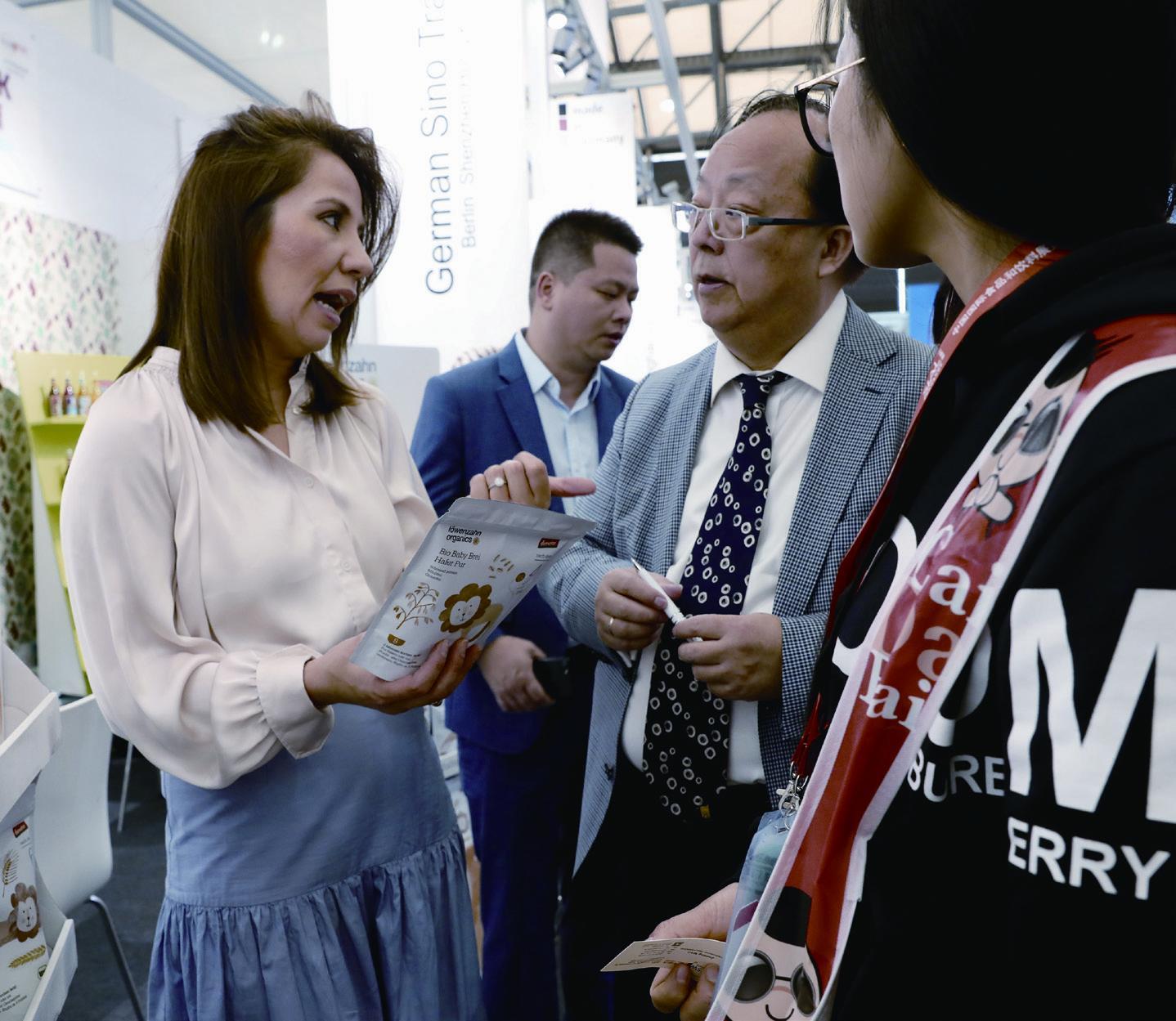A STEADY SIGNAL
2019-09-23ByWenQing
By Wen Qing


German Chancellor Angela Merkel has endeared herself to the Chinese with her approachable image during her frequent visits to China. In May 2006, for instance, she went for a stroll in the Changpu River Park in Beijing and experimented with tai chi balls, the traditional wooden balls used to practice the Chinese defense and meditative art, with a group of senior citizens doing their morning exercise in the park.
Then in July 2014, when she went to Chengdu, Sichuan Province in southwest China, famed for its hot cuisine and the hotter panda, she learned to cook a famous Sichuan dish, kung pao chicken, dished out with lots of dry red chili and peanuts, from a chef. And one of her best-loved extracurricular activities was in the fall of 2015, when she visited a primary school in Hefei, Anhui Province in east China, and taught the kids how to do arithmetic problems.
This month, she was back again, on her 12th official visit to China in her 14-year rule as chancellor. Coming with a large business delegation, she visited several Sino-German joint ventures and made a trip to Wuhan, Hubei Province in central China, continuing the tradition of visiting another Chinese city besides Beijing, an initiative she had started from her very first trip in order to know China better. On her earlier trips, she has been to other major cities like Shanghai and Guangzhou and Shenzhen in south Chinas Guangdong Province, and some cities that are not so much on world leaders itinerary like Hefei and Shenyang in Liaoning Province in the northeast.
The journey from Germany to China takes over 10 hours. So what brings Merkel to China so often despite the jet lag? And did this trip bear the fruits both countries were hoping for?
Observers said enhancing bilateral trade and economic links was still the top agenda of Merkels visit, especially with Germany feeling the pinch of sluggish economic growth and the Donald Trump administrations threat of tariffs on its imports to the U.S.
Opening-up benefits
In the second quarter of this year, Germanys GDP contracted 0.1 percent compared to the previous quarter, triggering an alert.
Dutch bank INGs chief economist in Germany Carsten Brzeski claimed the GDP report “definitely marks the end of a golden decade for the German economy.” Poor export performance was a critical reason. In the first half of this year, Germanys exports grew by 0 percent, partly due to the drop in auto sales to the U.S. and China as the impact of the trade friction between these two giants spreads globally.
However, overall trade with China continues to be a bright spot for the German economy. In 2016, China replaced the U.S. to become the largest trade partner of Germany and is now the third largest importer of German goods, a critical factor for an export-dominated economy like Germany. The bilateral trade reached nearly$200 billion in 2018 and in the first half of this year, continued to mount to $106 billion, up by 2.4 percent over the same period last year.
“The world economy is not in the best condition, and many markets have become more difficult for various reasons … Chinas economic growth slowed only a little and is of increasing importance to our companies,”Friedolin Strack, Managing Director of the AsiaPacific Committee of German Business, told the Hong Kong-based South China Morning Post.

Li Chao, an associate researcher with the China Institutes of Contemporary International Relations, echoed Strack, saying Chinas huge market is indispensable to German enterprises. The new round of opening up will provide more opportunities for them.
At the Symposium of the China-Germany Economic Advisory Committee on September 6 also attended by Merkel, Premier Li Keqiang said China is expanding opening up. The manufacturing sector will be fully opened and the financial and service sectors are to be further opened.
“A significant number of German enterprises have been the first beneficiaries,”Li said, adding that German companies are welcome to increase their investment in China and promote partnerships in technological innovation and new technology internationalization.
The auto industry has been one of the beneficiaries of Chinas opening up, including German companies. In 1994, foreign automakers that came to China to operate joint ventures with local partners could hold maximum 50 percent of the stakes. But last year, the cap began to be eased with all ownership limits for foreign car makers to be lifted by 2022.
Germanys BMW seized the opportunity last October, increasing its share from 50 percent to 75 percent in its joint venture with Brilliance China Automotive, becoming the first global car company to take control of a partnership.
In November 2018, German insurer Allianz SE was approved to establish the first wholly foreign-owned insurance company on the Chinese mainland in another example of the percolating benefits of Chinas continued opening up.
However, in the first six months of 2019, Chinese investment in Europe hit its lowest point in four years, with $9 billion in transactions, down from more than $50 billion in the first half of 2017, according to joint research by Baker McKenzie and the Rhodium Group.
Li urged Germany to allow Chinese companies fair market entry and relax restrictions on the export of hi-tech products to elevate the Sino-German relationship and achieve mutual benefit.
Merkel said Germany welcomes Chinese companies investment, and will promote negotiations on the EU-China comprehensive agreement on investment in 2020, when Germany takes the EUs rotating presidency.
According to Cui Hongjian, a researcher with the China Institute of International Studies, the conditions to sign the agreement have matured. The negotiations started in 2014 to open the markets to investment in both directions by providing a simpler and predictable legal framework. With the measures taken by the Chinese Government to remove hurdles for foreign investors, some problems in the negotiations could be resolved.
Mutual learning
Promoting bilateral cooperation with China in cutting-edge technology, such as artificial intelligence (AI), self-driven vehicles and 5G, was a focus of Merkels recent visit, according to He Zhigao, an associate researcher with the Chinese Academy of Social Sciences.
The European information technology market is controlled by U.S. enterprises such as Apple, Google and Facebook. European companies have limited development space, He said in an article in Peoples Daily. Promising European startups in advanced technology are being grabbed by the U.S. giants. From 2011 to 2016, Apple alone purchased 53 European technology firms, whose business scale all contracted in Europe after the sale.
Therefore, European leaders want to grasp the opportunity afforded by this new tide of technology represented by AI and 5G. The EU is pursuing a digital single market with its telecommunications and information service network to cover all EU countries across borders and nurturing a group of innovative companies. Collaborating with Chinese advanced technology firms will help Germany in this drive, according to He.
Although under U.S. pressure to ban Chinese telecom company Huawei, Merkel said while Germany will tighten its network security requirements, it will not single out individual companies.

